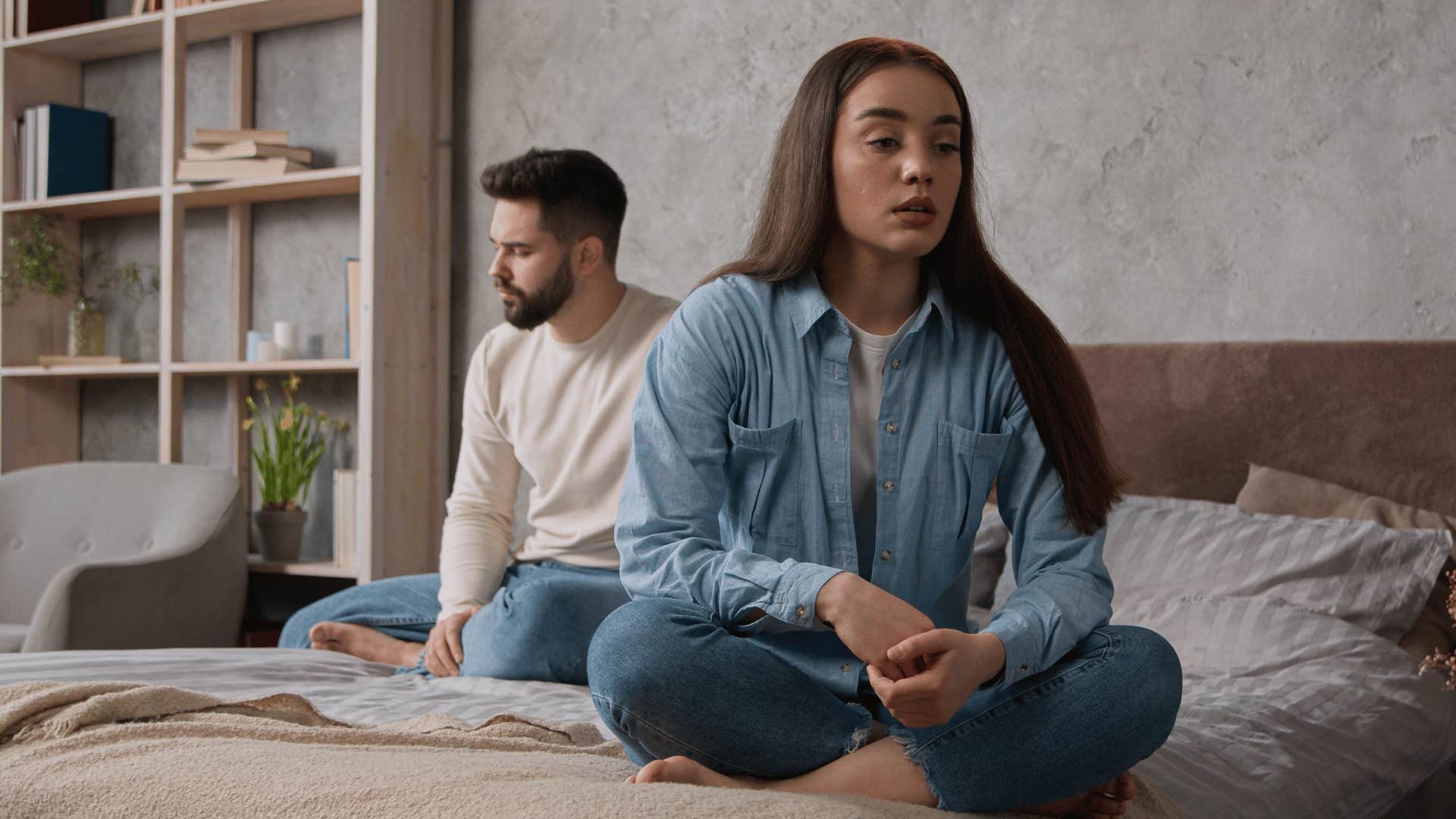11 Phrases Eldest Daughters Often Say Well Into Adulthood
The stress of expectations never really stops when eldest daughters grow up.
 iaginzburg | Shutterstock
iaginzburg | Shutterstock Psychologist Alfred Adler came up with the concept of the "family constellation" to describe the way family members relate to each other. Adler believed that family dynamics had a big impact on individual development.
His birth order theory posited that the order people were born in greatly influenced their personality, behavior, and life outcomes. Adler's birth order theory upheld the idea that firstborn children take on a more traditional role and have a strong sense of responsibility, while children born later are more rebellious in nature.
In keeping with the idea behind birth order theory, eldest daughters have the unique experience of carrying the weight of gendered societal expectations along with parental expectations. The concept of "Eldest Daughter Syndrome" caught fire on social media and spread, as eldest daughters around the world recognized themselves. Eldest daughters carry a particular perspective and say specific phrases well into adulthood that capture how being the firstborn girl distinctly shapes their life experience.
Here are 11 phrases eldest daughters often say well into adulthood
1. 'I can handle it on my own'
 fizkes | Shutterstock
fizkes | Shutterstock
A phrase eldest daughters often say well into adulthood is “I can handle it on my own,” which displays a fierce sense of independence and need for control. According to Kati Morton, a licensed therapist, eldest daughters are responsible for more domestic labor than their siblings.
Morton acknowledged that Eldest Daughter Syndrome isn’t a clinical diagnosis, but rather, “A term coined to describe the unique pressures and responsibilities placed onto the oldest daughter in the family.”
She made the claim that eldest daughters have “an intense feeling of responsibility” along with overachieving tendencies, which are traits that lend themselves to an eldest daughter’s belief that she has to do everything by herself.
The phrase “I can handle it on my own” is often declared with undertones of defensiveness or emotional distress. Eldest daughters don’t necessarily want to complete every household task on their own, but the expectations placed on them in childhood makes it hard for them to ask for help.
Learning how to ask for support is part of the healing process. It might not be easy for eldest daughters to admit they’re in need, but recognizing that no one can do everything alone and practicing self-compassion can ease their journey.
2. 'I don't want to be a burden'
 MAYA LAB | Shutterstock
MAYA LAB | Shutterstock
Another phrase eldest daughters often say well into adulthood is “I don’t want to be a burden.” This phrase goes hand-in-hand with the idea that they have to do everything on their own, which can stem from the belief that they’re just “too much.” They’re scared of imposing on other people, which means they struggle to take up space and get their needs met.
Morton maintained that eldest daughters often display people-pleasing behavior, along with having difficulty setting and upholding boundaries. These traits can affect the way eldest daughters enter relationships, since they carry over their childhood tendencies into their adult lives.
Therapist Nancy Carbone revealed that people-pleasing can be a form of self-sabotage, noting that “If you're always people-pleasing, it may be a red flag that you're not practicing the self-love that you need.”
She shared the signs of self-sabotaging by way of people-pleasing, explaining that “You can recognize signs that you're sabotaging yourself because you focus on everyone else but yourself.”
“You can subjugate your own needs in order to feel good about yourself,” she continued. “So, you end up abandoning your actual 'self' when your own needs do not get met.”
“You may be a self-sacrificer, caretaker, or rescuer in relationships. Perhaps you let other people’s needs take priority over yours. You may constantly invest in others, more than yourself. The more you invest in others and not yourself, the more you self-sabotage your own life.”
“You can find self-love within yourself instead of relying on others to validate you. Focus on yourself instead of seeking approval and love from others, which only compromises yourself,” Carbone concluded.
The patterns of people-pleasing behavior and discarding your own needs can be hard habits to break, but holding tight to the belief that you deserve to put yourself first in your own life is crucial to being your most authentic self.
3. 'Do you need help?'
 Chay_Tee | Shutterstock
Chay_Tee | Shutterstock
Eldest daughters often ask everyone around them if they need help, because they’ve been trained to be caretakers and minders of other people’s emotions. Eldest daughters who ask others if they need help exist at the intersection of family obligations and the societal expectations placed on women starting in childhood.
Young girls are told to be nice, more than anything else. They’re expected to check their own emotional needs in service of others. These expectations carry through into adulthood and become especially crystalized in motherhood.
All too often, moms are expected to take on more than they can handle and smile while they do it. These moms end up carrying the weight of their family on their shoulders, as they’re tasked with all the invisible and emotional labor it takes to keep a household running. It’s no wonder that so many moms are parenting from the trenches of burnout, just trying to keep their heads above water.
Morton noted that eldest daughters often feel resentment towards their family and struggle with feelings of guilt, which isn’t particularly surprising. Living in the depths of contempt holds women back from cultivating relationships that fully nourish them. Letting go of the expectation that they have to help everyone is a move toward freedom and fulfillment.
4. 'I can't let anyone down'
 fizkes | Shutterstock
fizkes | Shutterstock
Another phrase eldest daughters often say well into adulthood is “I can’t let anyone down.” They’ve internalized the pressure their parents put on them in such a way that they think any misstep will lead to extreme disappointment. Their need to not let anyone down dictates the path their life takes. They often make decisions based on their parents’ expectations of them, instead of what they want for themselves. They might choose a certain major in college or pick a career because of what their parents think they should do.
A major part of believing that they can’t let anyone down stems from being highly self-critical. Harsh self-criticism sometimes comes from being raised in a judgmental household, but that’s not the only indicator. Even if they were raised by parents who offered unconditional support and love, eldest daughters’ inner critics tend to skew negative. Parental expectations might come from a good place, but they usually end up being a heavy weight that keeps eldest daughters from living their own version of life.
5. 'I don't have time to relax'
 fizkes | Shutterstock
fizkes | Shutterstock
Eldest daughters often say “I don’t have time to relax” because they base their sense of self-worth on their level of productivity. They’re achievement-oriented, meaning that they judge themselves based on academic, professional or personal successes.
Some scholars believe that birth order not only influences personality traits, it also influences intelligence levels. According to a study in the Journal of Research in Personality, the confluence model posits birth order determines the level of intellectual stimulation that’s available during a child’s early developmental years. This theory holds that first-born children have higher levels of intelligence than their later-born siblings. First-born kids receive their parents’ undivided attention, which in turn, creates a more intellectually stimulating environment for them to grow up in.
The study acknowledged the other factors that influence intelligence besides birth order, including age, gender, a family’s socioeconomic status and structure, and the total number of siblings in a family.
Whether or not birth order is associated with intelligence, eldest daughters often have a hard time letting themselves just do nothing, as they associate how busy they are with how worthy they are.
Yet taking time to rest and reset is essential for maintaining your mental and physical health, which is one reason why self-care is so vital. Therapist Gloria Brame explained that the goal of true self-care is to set yourself up for success by giving yourself what you need.
“Sleeping well, getting a restful nap, making sure to move your body throughout the day, practicing gratitude, and making time for meditation all help your body and mind feel more vigorous and alive — and help you weather problems that life may throw your way,” she concluded.
6. 'I can't afford to make mistakes'
 SistersStock | Shutterstock
SistersStock | Shutterstock
Another phrase eldest daughters often say well into adulthood is “I can’t afford to make mistakes.” This phrase ties into the idea that their productivity and success determines their worth. They tend to have a rigid sense of who they are. They define themselves through what they do: They’re moms and wives, they’re managers, employees, and students. They don’t realize that adhering to such a strict view of themselves cuts them off from so many other possibilities.
Because they build their sense of self around their accomplishments, they’re terrified to make mistakes, in case messing up means they’re not actually worthy of love and support.
As YourTango expert Sidhharrth S. Kumar explained, “Fear is one of the most common reasons for people not [to be] able to admit they are wrong at the right time. The worry associated with harm to their reputation and credibility derails their awareness and acceptance of being incorrect.”
Eldest daughters who were expected to reach the goals their parents imagined for them usually have a hard time letting themselves off the hook. It might take time and effort for eldest daughters to rewire how they think about making mistakes, but it’s entirely worth it for them to do.
7. 'I have to hold everything together'
 fizkes | Shutterstock
fizkes | Shutterstock
Eldest daughters often say “I have to hold everything together” because being responsible is deeply ingrained into their identities. This phrase captures the perfectionist tendencies that eldest daughters fall prey to. They’re so focused on being perfect and showing up for everyone in their lives that they don’t take time to just breathe or let things be as they are.
Archanaa Shyam, an Intuitive Visionary Strategist, shared the underlying reasons why indulging perfectionism is such a dangerous habit.
“When we are seeking perfection we will never be done,” she explained, defining this tendency as “The fundamental flaw of perfectionism.”
“But there is an alternative,” Shyam exclaimed. “Appreciating progress.”
Progress not perfection is more than just a mantra to repeat to your own reflection. It’s a way of existing as your fullest self and not holding yourself up to impossible to reach standards. Releasing the idea of perfection and accepting the fact that we are always works in progress can help eldest daughters— And everyone else— live happier lives.
8. 'I don't know what to do with myself when I'm not working'
 Dima Berlin | Shutterstock
Dima Berlin | Shutterstock
Another phrase eldest daughters often say well into adulthood is “I don’t know what to do with myself when I’m not working.” They spent their childhood aiming for straight As, which led them into an adulthood of overcommitting to their jobs. The drive and determination that guided them in their younger years often turns into extreme burnout as they get older.
An analysis of data from a survey of families in England showed that first-born daughters are the most successful and ambitious members of their families.
The researchers found that eldest daughters are 4% more likely to pursue higher education than eldest sons. The study also revealed that the oldest children who were surveyed were 7% more ambitious than later-born children, a statistic that gives credibility to the idea that birth order influences intelligence.
Head researcher Feifei Bu stated that “There are several possible explanations for the higher attainment and ambition of the eldest. It could be that the parents simply devote more time and energy to them— it could be that they are actually more intelligent. For me, I tend to lean towards the theory that parental investment is possibly at work here.”
Until eldest daughters learn that relaxation is crucial to keeping up their productivity, they’ll continue pushing themselves off the cliff of high expectations, and they won’t land softly.
9. 'I hate not having a plan'
 PeopleImages.com - Yuri A. | Shutterstock
PeopleImages.com - Yuri A. | Shutterstock
Another phrase eldest daughters often say well into adulthood is “I hate not having a plan.” They’re so accustomed to being relegated to the role of “the responsible one” that they struggle to just let things go with the flow.
As the study from the Journal of Research in Personality stated, first-born children fill a traditional role within their family structure. In addition to having more responsibilities, they’re often held up as role models for their younger siblings, which makes them extra concerned about pleasing their parents. In contrast, later-born children fill the more “rebellious” role. They’re easy-going and sociable, as there’s less pressure on them to perform.
While younger siblings might have a more “Turn on, Tune in, Drop out” mindset, eldest daughters grow up feeling like they need to plan for every possible permutation, which makes it hard for them to let other people take the reins.
10. 'Are you mad at me?'
 Josep Suria | Shutterstock
Josep Suria | Shutterstock
Asking “Are you mad at me” is another phrase eldest daughters often say well into adulthood. They hold onto the belief they were taught as kids, that they’re supposed to manage how everyone else feels. They’re so wrapped up in navigating other people’s emotions that they often lack the self-awareness they need to recognize how they feel.
Psychologist Nick Wignall shared that having emotional strength requires people to take a pause and observe what’s going on in their heads, which allows them to notice how they feel and then act with intention. He also explained that practicing self-compassion is essential to understanding and accepting your feelings.
“Most of us learned growing up that the ‘secret’ to success and happiness in life is to be hard on yourself,” he stated, noting that “initial difficult feelings are often inevitable.”
“No matter how self-compassionate you are, making mistakes still stings and will likely lead to some amount of guilt or shame,” Wignall revealed. “No matter how self-aware you are of your painful emotions, they will still hurt when they show up unannounced.”
Managing our emotions and accepting the fact that we can only control how we feel, not how anyone else feels, is a big step on the journey to self-acceptance.
11. 'Don't worry about it'
 wavebreakmedia | Shutterstock
wavebreakmedia | Shutterstock
Another phrase eldest daughters often say well into adulthood is “Don’t worry about it.” They say this when someone in their life has disappointed them, but they don’t want to create waves by expressing their true feelings. Instead, they tamp down their emotions, and say, “Don’t worry about it.” The phrase might be followed by a dismissive shrug or the exclamation, “Really, it’s fine. I’m fine,” when the truth is, they’re not fine. They’re hurt and scared to share that hurt, in case they get rejected.
Eldest daughters can take back their power by showing the full range of their emotions, even the difficult ones. They can acknowledge that trying to manage their feelings in service of other people doesn't make those feelings disappear, but rather, lay dormant until they come back even stronger. Eldest daughters can break the cycle and give themselves permission to feel and to care.
While we can’t choose the family we’re born into or the order we were born in, we can choose how we show up for ourselves throughout our lives.
Alexandra Blogier is a writer on YourTango's news and entertainment team. She covers social issues, pop culture analysis and all things to do with the entertainment industry.

